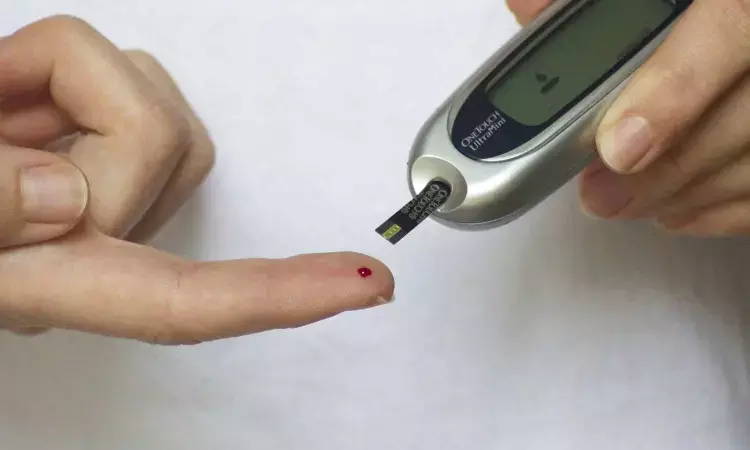- Home
- Medical news & Guidelines
- Anesthesiology
- Cardiology and CTVS
- Critical Care
- Dentistry
- Dermatology
- Diabetes and Endocrinology
- ENT
- Gastroenterology
- Medicine
- Nephrology
- Neurology
- Obstretics-Gynaecology
- Oncology
- Ophthalmology
- Orthopaedics
- Pediatrics-Neonatology
- Psychiatry
- Pulmonology
- Radiology
- Surgery
- Urology
- Laboratory Medicine
- Diet
- Nursing
- Paramedical
- Physiotherapy
- Health news
- Fact Check
- Bone Health Fact Check
- Brain Health Fact Check
- Cancer Related Fact Check
- Child Care Fact Check
- Dental and oral health fact check
- Diabetes and metabolic health fact check
- Diet and Nutrition Fact Check
- Eye and ENT Care Fact Check
- Fitness fact check
- Gut health fact check
- Heart health fact check
- Kidney health fact check
- Medical education fact check
- Men's health fact check
- Respiratory fact check
- Skin and hair care fact check
- Vaccine and Immunization fact check
- Women's health fact check
- AYUSH
- State News
- Andaman and Nicobar Islands
- Andhra Pradesh
- Arunachal Pradesh
- Assam
- Bihar
- Chandigarh
- Chattisgarh
- Dadra and Nagar Haveli
- Daman and Diu
- Delhi
- Goa
- Gujarat
- Haryana
- Himachal Pradesh
- Jammu & Kashmir
- Jharkhand
- Karnataka
- Kerala
- Ladakh
- Lakshadweep
- Madhya Pradesh
- Maharashtra
- Manipur
- Meghalaya
- Mizoram
- Nagaland
- Odisha
- Puducherry
- Punjab
- Rajasthan
- Sikkim
- Tamil Nadu
- Telangana
- Tripura
- Uttar Pradesh
- Uttrakhand
- West Bengal
- Medical Education
- Industry
Early onset of Diabetes linked to increased risk of dementia

Researchers at Johns Hopkins Bloomberg School of Public Health, Baltimore, USA have found an association between type 2 diabetes (T2D) and developing dementia. Early onset of diabetes was associated with increased risk of dementia in later life.
The new research has been published in the Journal Diabetologia
Their study investigated the association between prediabetes and dementia. Prediabetes is an intermediate stage of high blood sugar, where blood sugar is high but has not yet crossed the threshold for T2D. Prediabetes confers a high risk of progression to diabetes but is also independently associated with other clinical outcomes. Most people who develop T2D first pass through this ‘window’ of prediabetes.
The risk of progression to T2D among people with prediabetes is substantial; among middle-aged adults with prediabetes, 5–10% per year go on to develop T2D, with total of 70% of those with prediabetes progressing to T2D during their lifetime. In the USA, up to 96 million adults have prediabetes, accounting for 38% of the adult population.
To understand the risks of dementia associated with prediabetes, the authors analysed data from participants of the Atherosclerosis Risk in Communities (ARIC) study. Those enrolled were aged 45–64 years in 1987–1989 and from four US counties: Forsyth County, North Carolina; Jackson, Mississippi; suburbs of Minneapolis, Minnesota; and Washington County, Maryland. The baseline period for the analysis was visit 2 of the study (1990–1992), which was the first time where HbA1c (glycated haemoglobin – a measure of blood sugar control) and cognitive function were measured in this study.
The cognitive function assessments incorporated data from a scoring system involving three cognitive tests, administered at visits 2 (1990–1992) and 4 (1996–1998), the expanded neuropsychological ten-test collection, administered from visit 5 (2011–2013) onwards and informant interview (Clinical Dementia Rating [CDR] scale and the Functional Activities Questionnaire [FAQ]). The Mini-Mental State Examination (MMSE) was also administered. Participants were followed up until 2019.
The authors defined prediabetes as glycated haemoglobin (HbA1c - a measure of blood sugar control) of 39–46 mmol/mol (5.7–6.4%). They also looked at subsequent diagnoses of T2D during follow-up.
The authors evaluated the association of prediabetes with dementia risk before and after accounting for the subsequent development of T2D among ARIC participants with prediabetes at baseline. This was done to understand how much of the association of prediabetes with dementia was explained by progression to diabetes. They also evaluated whether age at diabetes diagnosis modified the risk of dementia.
Among 11,656 participants without diabetes at baseline, 2330 (20%) had prediabetes. When accounting for diabetes that developed after the baseline period, they authors found no statistically significant association between prediabetes and dementia. However, they found that earlier age of progression to T2D had the strongest association with dementia: a 3 times increased risk of dementia for those developing T2D before age 60 years; falling to a 73% increased risk for those developing T2D aged 60-69 years and a 23% increased risk for those developing T2D aged 70-79 years. At ages 80 years or older, developing T2D was not associated with an increased risk of dementia.
The authors conclude: “Prediabetes is associated with dementia risk, but this risk is explained by the development of diabetes. Diabetes onset at early age is most strongly related to dementia. Thus, preventing or delaying the progression of prediabetes to diabetes will substantially reduce the future burden of dementia.”
Reference:
Hu J, Fang M, Pike JR, Lutsey PL, Sharrett AR, Wagenknecht LE, Hughes TM, Seegmiller JC, Gottesman RF, Mosley TH, Coresh J, Selvin E. Prediabetes, intervening diabetes and subsequent risk of dementia: the Atherosclerosis Risk in Communities (ARIC) study. Diabetologia. 2023 May 24. doi: 10.1007/s00125-023-05930-7.
Dr Kamal Kant Kohli-MBBS, DTCD- a chest specialist with more than 30 years of practice and a flair for writing clinical articles, Dr Kamal Kant Kohli joined Medical Dialogues as a Chief Editor of Medical News. Besides writing articles, as an editor, he proofreads and verifies all the medical content published on Medical Dialogues including those coming from journals, studies,medical conferences,guidelines etc. Email: drkohli@medicaldialogues.in. Contact no. 011-43720751


